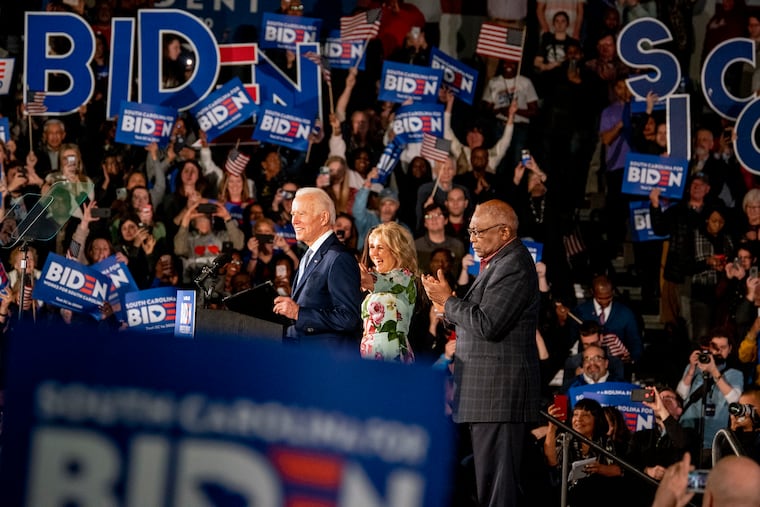With a year until Election Day, Biden must confront his problem with the Black vote
The president and his party would be wise not to ignore recent poll results signaling an erosion of support among African Americans.

Does President Joe Biden have a problem with the Black vote? Yes. Is it as dire as suggested by a recent New York Times/Siena College poll of five battleground states that said 22% of Black Americans and 27% of Black men surveyed favored Donald Trump? Probably not.
First of all, the poll of voters in five states shouldn’t be mistakenly considered as an accurate assessment of the nation’s pulse. Also, the fact that these five states (Arizona, Georgia, Michigan, Nevada, and Pennsylvania) are described as “battlegrounds” means they have significant numbers of conservative voters, including conservative African Americans.
The Biden campaign has been quick to point out that the survey’s sample of 3,662 “likely voters” is too small to jump to conclusions. That is particularly so when it comes to the poll’s paltry 403 Black likely voters. Given the election is still a year away, the poll results are meaningful as an early signpost, but the numbers don’t deserve the week of headlines they have received.
Responsible news organizations pledged years ago to stop covering elections like horse races. Yet here they are, nudging readers to pore over the poll numbers instead of paying greater attention to what they are reporting about the presidential candidates’ actual ability to serve.
That doesn’t mean early polls should be ignored. Many Black voters are dissatisfied with Biden’s performance, and having a Black vice president hasn’t helped. Kamala Harris may be doing her job as well as any previous vice president, but it’s a job that rarely garners much recognition, and when the spotlight is placed on her, she usually lacks the charisma to shine.
It’s no secret that, given Biden’s age, some Democrats who fear he may become incapacitated would like him to dump Harris for someone else. Many Black voters would likely become more enthusiastic about the 2024 ticket if Georgia politician Stacey Abrams, who helped Biden win that red state in 2020, replaced Harris. But maneuvering that would be tricky and is unlikely.
Instead, Biden and Harris must jointly confront the erosion in Black support, indicated by the Times/Siena survey and other polls, before what those early assessments signal becomes reality.
Biden has worked hard to shore up the blue-collar vote that Democrats once took for granted. He became the first U.S. president in history to walk a picket line when he showed up at a Michigan auto plant in September. Trump called it a “publicity stunt,” something he knows a lot about. But the big three automakers and the United Auto Workers came to an agreement after Biden’s visit, which gained him capital with other unions and improved his reelection chances.
Black voters want more than a symbolic gesture. Many believe they got little more than that from Barack Obama. His presidency did benefit African Americans. For example, given our being a disproportionate share of the uninsured, we benefited greatly from the Affordable Care Act, or Obamacare, as it was disrespectfully dubbed by Republicans. But Black voters crave measures that more explicitly speak to them.
They never got that from Obama, who rarely spoke in terms of race so as not to offend white Americans. Conversely, Biden needs to reassure Black people who have grown weary of voting for Democrats who fall short of their expectations.
Not even the early polls suggest Trump will get a large share of the Black vote, but he won’t need to if their turnout is low and a significant number vote for fringe candidates, such as former Harvard and Princeton professor Cornel West.
Republicans are counting on that. It’s why legislatures in several GOP-controlled states have frantically passed laws since the last presidential election to make it harder for anyone to vote. Texas, where I now live, has some of the most restrictive voting rules in the nation. Without offering any credible evidence, Republican legislators falsely claim they are fighting voter fraud.
Tougher voting rules don’t help, but they won’t keep Black voters from voting. African Americans have overcome poll taxes and literacy tests, not to mention incarceration and assassination, to cast their ballots. What they need now is motivation. If Biden and Harris don’t provide it, too many may stay home on Election Day rather than vote for either them or Trump.
Even if Biden wins, the Democratic Party can’t afford to keep disappointing what is arguably the most important part of its base.
Even if Biden wins, the Democratic Party can’t afford to keep disappointing what is arguably the most important part of its base.
Democrats need to remember that African Americans voted Republican, the party of the Great Emancipator, Abraham Lincoln, for decades after the Civil War. They even remained loyal after Republican presidents allowed Reconstruction to fail and the Ku Klux Klan to rise. Only after Franklin D. Roosevelt ended the Great Depression with his New Deal in the 1930s did that begin to change. After Lyndon B. Johnson fulfilled their civil rights goals in the 1960s, most Black Americans became Democrats.
The lesson to be learned from the past 100 years is that Black Americans vote in their best interest, and what the early polls are showing us now is that many haven’t made up their minds.
Harold Jackson, a winner of the Pulitzer Prize, is a former editorial page editor at The Inquirer.